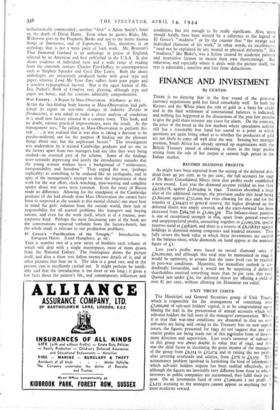War Factory. A Report by Mass-Observation. (Gollancz. 4s. 6d.) AFTER
the fact-finding body known as Mass-Observation had pub- lished its report on war-time changes in industry (People in Production), it was asked to make a closer analysis of conditions in a small new factory situated it a country town. This book, and no doubt, various practical improvements, were the 'result. As the management says, "In calling in Mass-Observation to perform this task . . . it was realised that it was akin to taking a decision to be psycho-analysed, not for the purpose df finding out the pleasant things about one, but the unpleasant factors." The investigation was undertaken by a trained Cambridge graduate and no one in the factory apart from two managers had any idea they were being studied—an essential part of the scheme. Some of the findings were certainly depressing and justify the introductory remarks that the young women workers have a background of "aimlessness, irresponsibility and boredom." They regard the war, (perhaps explicably) as something to be endured like an earthquake, and in spite of the management's attempt to show the importance of their work for the war effort, clock watching, time-wasting and complete apathy about war news were common. Even the entry of Russia made no difference. Allowing for the standpoint of the Cambridge graduate (if she had already done Mass Observation she cannot have been io surprised as she sounds at this mental climate) one must bear in mind the girls' isolation from the outside world, their lack of responsibility 'for all- normal problems like transport and buying rations, and even for the work itself, which is of a routine, non- corporate kind. Perhaps the most fascinating part of the book are the conversations reported verbatim from the factory-bench, but the whole study is relevant to our production problems.


























 Previous page
Previous page